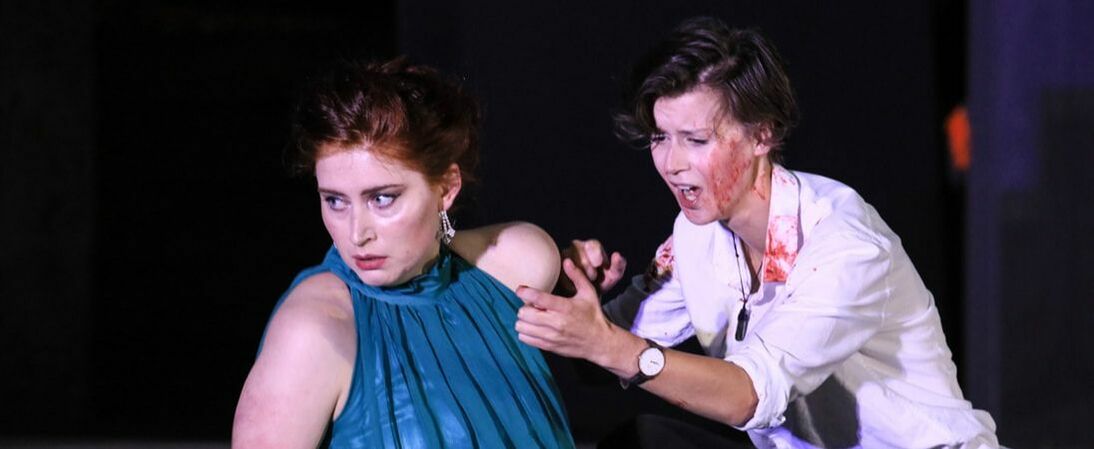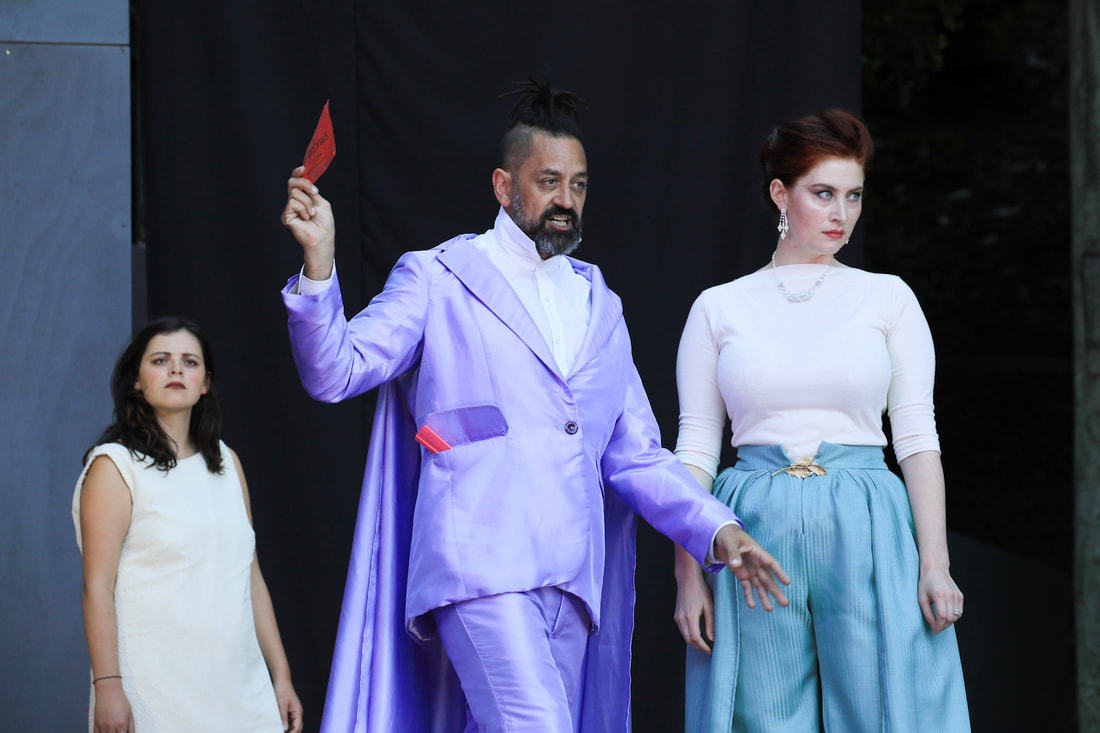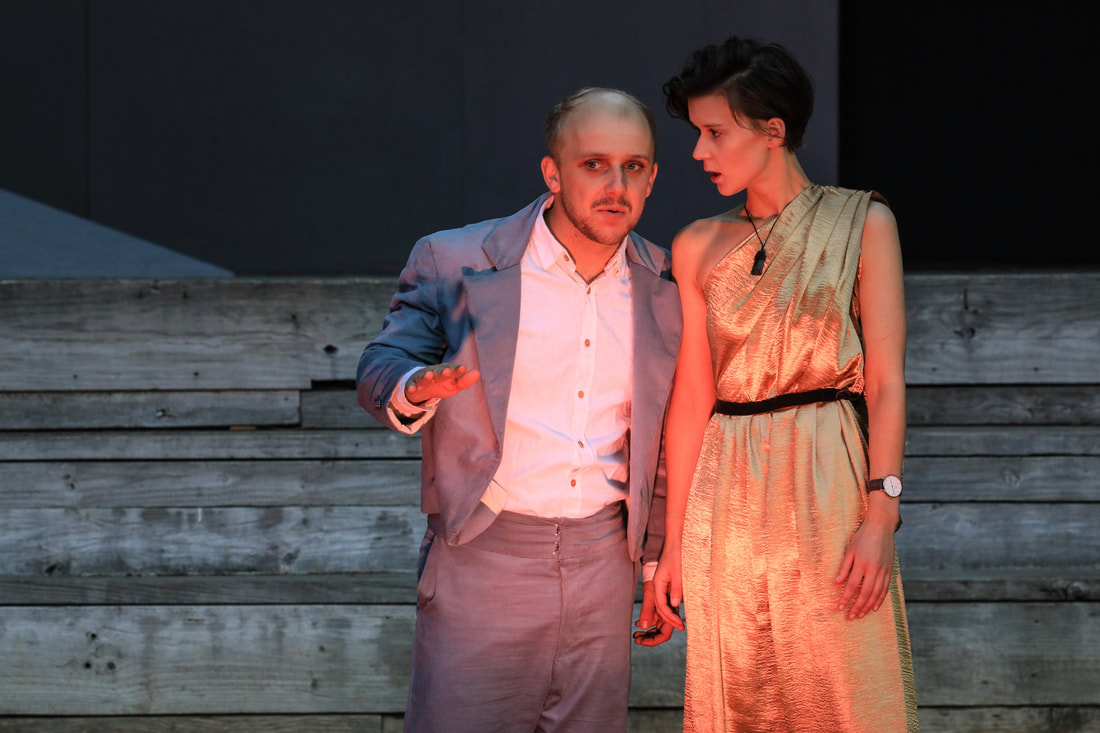Emilie Hope
Shakespeare’s plays famously hold universal themes, such as love, madness, and the dangers of power. These stories are dressed differently and retold a thousand times over. So what’s new with David O’Donnell’s version? Why do we need a female Hamlet? It’s more reflective of our world today: women are taking centre stage in social justice spaces, the political circuit, and art fields, and if art is reflective of society, it makes sense to see women centre stage (literally!) at The Dell. Having more women in central roles such as Hamlet and Polonius (Ivana Palezevic), debunks “Frailty, thy name is woman.” Having a woman speak this line removes the plain sexism and introduces a complex understanding women have about woman-ness. The play further explores this statement by having no fathers. The only father of the play appears in his ghostly form a handful of times; Claudius is childless; and Polonius is a mother. O’Donnell’s casting of women in principal roles celebrates the complexity of the characters as they explore the femininity and sexuality of women.
Hamlet, of course, is about as complicated and conflicted as you can get. Hancox-Monk beautifully guides us through her thought processes and emotional upheavals. Hancox-Monk was simply a delight to watch, keeping me entertained at all times. I particularly enjoyed when she toyed with her fellow actors such as Polonius, Rosencrantz (Elsie Bollinger) and Guildenstern (Sally Bollinger), and even the gravedigger (Jane Paul).
White brings a fierce regality that made me both incredibly proud and subservient to her presence. Because Gertrude has a daughter, this creates a stronger empathetic tie towards Ophelia. White often reaches for Ophelia and seems particularly distraught when sharing the news of her death, her hair and clothes dishevelled, clutching to limp flowers. Did she try to save Ophelia? I’d like to think she tried. Her interactions with Hamlet were sweet. Towards the end of the play, she later takes agency by ignoring Claudius’s commands. (Yas queen!)
Polonius is a very particular, ageing woman, her stiffness becoming part of her charm. In Palezevic’s Polonius, I saw a woman struggling between the formalities of the life at court and needing everything to be just-so and wanting to be a loving, caring mother. At first, she seems rather cold with Ophelia, her daughter, but later loosens from her rigidity and shows genuine care for her. Polonius sparks genuine comedy when she grinds Gertrude’s gears, over Hamlet’s love letters to Ophelia, and she’s a little slow to get to the point.
Ophelia seems to be a relatively average, fun young woman in love with Hamlet. Nimon plays her madness as more angry and upset than an actual mental breakdown. This is incredibly refreshing as depictions of women’s mental health has often been linked to our emotional “fragility”, but here we see more of a humanity in Ophelia. I was able to connect with her on a personal level – I mean, who hasn’t been broken up with for no real reason? Through Nimon, Ophelia becomes more of a relatable human going through a really tough time that only gets worse.
The play reminds us that women are as complex as men, and emotions, rather than being a weakness, are an integral component of being human.
Even Claudius is not free from frailties. Tawhi Thomas gives Claudius charisma and charm. He often had the audience laughing with rolling of the eyes, or even a power sashay walk away, a flash of red light on his face reminding us that he is the baddie of the play. In a moment of torment, hair out, Claudius confesses to us that his “offence is rank”, showing that he does genuinely care for Gertrude, and tries to ask for forgiveness from the gods. This was reflected in Hamlet’s hesitation and finally her decision not to kill him when he was purging his soul, but Claudius takes advantage of our good will, indicating his “words float to heaven, but my thoughts remain below: words without thoughts never to heaven go.” Boy, did I feel betrayed but also pleased to be betrayed by such a complex villain.
These fresh takes on Shakespeare’s characters are beautifully framed by the Wellington Botanical Gardens (celebrating its 150th birthday!), tree rustling and native bird songs and all. The BYO atmosphere brings a level of relaxation which allows the audience to take in the story.
I have to fangirl over the set a little bit. Designed by Lucas Neal, the set used the raised stage already available to the players in The Dell but added a ramp to accompany the main steps, another upstage-left, and a small set of stairs upstage-right, all reminding me of a Snakes and Ladders metaphor for the complex power struggles within the play. The two wings jutted out, one further forward than the other, and extended to a single plank of wood, which guide the black curtains. From the centre of the audience, this probably made it look like a house, but it cleverly disguises the fact that these are not connected and therefore gives the look of a broken whare: perfectly representing the dysfunctional royal family of Denmark.
And eughmehgeud, the costuming! Jodi Walker gave each character a colour or fabric palette. Gertrude was often in chiffon greens and blues, Claudius in a fabulous silk suit of pink, and purple, opting for darker pieces towards the end of the play, even the ghost had the most fabulous white costume, reminiscent of a bride with a long piece of white silk attached the the bottom of his blazer, which the ensemble beautifully bellowed in the wind. And let’s not forget Hamlet donning the dope as “NOPE” shirt by the NOPE SISTERS - Wellingtonians supporting Wellingtonians against sexual harassment is always a hard tick in my book.
Lighting is always tricky in an outdoor space, during a daylight-saving time, but David Conroy played to the natural lights strengths. The actors were softly lit with warm and cool colours while there was still sunlight, opting for more fabricated and ominous greens and red towards the end of the piece once dusk had settled, perfectly chiming into the play’s narrative.
All the performers should be commended for showing a sense of complete unity. While some shone in the roles they stepped into (honourable mentions to Jane Paul, Dylan Hutton as Horatio, and Harriet Hughes as Osric), they just as easily returned to the ensemble and were able to create beautiful soundscapes, become staunch soldiers, and distraught courtiers.
David O’Donnell’s version of Hamlet is a hugely important reflection of our current society, and shows how we can take important steps towards equality in all aspects. He has outdone himself. I encourage everyone of all ages to see this pinnacle of Summer Shakespeare’s shows.
Confession: I prefer this version of Hamlet.
Hamlet is running at The Dell until Saturday the 2nd of March. Find your tickets here, and follow weatherly updates on the Facebook event page here.










